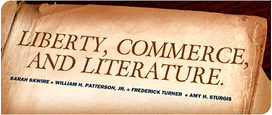Fred Turner and Amy Sturgis have neatly delineated another pair of problems surrounding the efforts to breathe new and more liberty-inspiring life into the same old discussions of business and literature. Turner speaks from experience about the difficulties of finding ways to negotiate deep-seated disagreements with the weight of critical history. Sturgis voices an equally experienced and well-founded frustration with the elitism of “those defenders of the canon who tirelessly strive to keep the barbarians on the other side of our gates and themselves in positions of control.”
Centuries of literary criticism and snobbery seem aligned against those who suggest that perhaps there is space in literature for markets, and individual liberty, and a state that is not the source of all good things. And many academics, book reviewers, and journalists seem deaf to the suggestion that perhaps that space is already populated by works we need to reconsider (as Turner so ably does with The Merchant of Venice), or take more seriously (as Sturgis does with her look at science fiction and young adult literature), or acknowledge the existence of (as I have done, here and in a recent APEE paper, with early twentieth century women’s fiction and with contemporary romance fiction). Piling Turner’s and Sturgis’s Pelion atop my Ossa makes a fairly dispiriting picture. Have we all simply read with such ardor and avidity that we are madly tilting at literary windmills?
In the absence of the vivid coffee house/Royal Society/Enlightenment culture praised by William Patterson, how are we to accomplish change in what our culture produces and in how those cultural products are understood?
I think all of our essays here have suggested a range of possible answers, but I want to note that there is one significant possible solution that we have, as yet, not discussed. After my initial essay was published at Cato Unbound I had a certain number of emails and Facebook posts from friends saying, more or less, “Read more? More? Come on, Sarah. I’ve got 30 books on my nightstand, a list of books to be reviewed that’s as long as my arm, and that’s just the stuff from within my field! You want me to pick up the complete works of Dickens, all of Shakespeare, Melville, and every bit of contemporary genre fiction as well?” Naturally I do. My degrees are in English literature. As Fred can attest, this is how we roll.
But given that not everyone considers a day spent reading John Donne’s complete sermons as refreshing as a day at the beach, I suggest, instead, that we begin seriously to exploit gains from trade. In other words, let’s do some real interdisciplinary work. The co-authored kind. Deirdre McCloskey’s Bourgeois Virtues and Bourgeois Dignity, Michael Watt’s Literary Book of Economics, the novels of Russ Roberts, and countless conversations I’ve had with economists and friends suggest to me that there is a strong interest from the economics side of this equation in exploring literature from a free market angle. Cox and Cantor’s Literature and the Economics of Liberty, the Harry Potter scholarship Sturgis references, and the discussion here evince equal interest in these questions from the humanities side. In fact, I recently read an interesting article about the property rights debate in Andrew Marvell’s “Horatian Ode.” People are approaching these issues, individually, from both sides of campus. It just seems difficult for us to find each other. It is, in other words, “a problem of the utilization of knowledge which is not given to anyone in its totality.”
Now, I hesitate to suggest that a government agency should be created whereby humanities scholars and economists are paired up upon the receipt of their degrees and told to go forth and multiply their publications. I do think, however, that one very good way to get good humanities scholarship that contains good economics, and good economics that contains good literary scholarship, is for similarly minded scholars from these disciplines to find each other, find texts that intrigue and excite them, and find the questions that they are, as a team, well suited to consider. The 21st century coffeehouse of social media has made this kind of connection easier than ever, and we ought to exploit its power.
There are problems facing that sort of work, of course. At the moment, I don’t know of a journal that focuses its attention on interdisciplinary work from the humanities and economics. But then, it wasn’t that long ago when no one had thought of a journal like Literature and Medicine and the idea of scholarship in the “medical humanities” would have seemed absurd. Co-authored articles are undervalued in literature departments as entries in tenure files. And it can be tricky to find conferences where that kind of radically interdisciplinary work can be presented.
I think the game, in this case, is well worth the candle. The more work there is of this kind, the easier it is to find support for a journal, to raise interest in conference panels, to collect papers for edited volumes. The more work there is of this kind, the more able we are to draw attention to the cultural productions that do speak of liberty and responsibility, of free minds and free markets.

